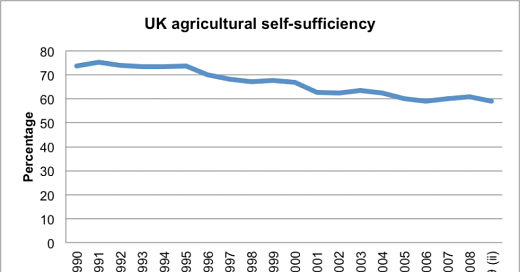This graphic and a bunch of similar ones have been floating around the web and social media. A more up-to-date figure that appears on the National Farmers Union website says that the UK was 62% self-sufficient in food in 2023. To be frank I’m having trouble squaring this circle as other data doesn’t seem to support this figure. I’m not having a go at UK farmers. In today’s post-truth world it’s important to see our way through to the real situation.
The UK governments own data tells us that “The UK currently produces about 60% of its domestic food consumption by economic value, part of which is exported. This means just under half of the actual food on plates is produced in the UK, including the majority of grains, meat, dairy, and eggs.” So the UK isn’t 60% self-sufficient in food, it’s less than 50%.
They say that the devil is in the detail and when the overall figures are broken down the picture isn’t very rosy.
Wheat
On average, the UK produces enough wheat for its domestic needs, but, the quantity is there but not the quality needed for modern bread manufacture. So, the UK imports about 15% of the wheat that is needed, which amounts to around 750,000 tonnes. It comes from Canada, Germany, France, and the USA. So, as the UK government statistics point out, UK is self-sufficient in wheat in terms of quantity. But, because people don’t eat wheat, they eat bread, the UK, has to import.
Fruit
The Government tells everyone to eat more fruit. The UK produces 16% of the fruit it needs; the rest is imported.
Vegetables
It’s a bit better here, the UK produces 50% of the vegetables it needs, most of the rest are imported from Europe. We’re still not up to the 60% self-sufficiency figure though. Potatoes are ok though at 70%.
Sugar beet
This looks like it’s all good, 60% of sugar beet is locally produced. But, and it’s a big but, most of this went on to be transformed into non-food biofuels. In fact a part of the wheat and maize locally produced goes the same way. 133,000 hectares of agricultural land is put to biofuel crops.
Meat, milk and eggs
Good news here, the UK produces, more or less, enough to feed domestic demand. But, and yes there’s another but, The UK is a net importer of dairy and beef. How is that even possible? Well the UK population prefer the imported beef and dairy over and above that which is produced locally. So there we are.
Fish
This is a great one that I’ve saved for last. Most of what is locally caught is exported and most of what is locally consumed is imported. Fascinating. Again, the UK citizens prefer the types of fish that are imported over the types that are caught in UK waters.
Money
“By value, £48 billion of food, feed, and drink (FFD) was imported and £21.4 billion was exported.” Leaving aside the environmental impacts of cargo ships and cargo aircraft, UK agriculture is financially skewed. Forget 60%, in financial terms the UK self-sufficiency is less than 50%.
The above figures bear out the fact that the UK is a long way from being self-sufficient. It also brings up the fact that we need to calculate in terms of ‘people fed per hectare’ and not tonnes per hectare. We can’t simply lump in all the maize, wheat and sugar-beet that is turned into biofuels as ‘food’. What we also see is how consumer preferences skew the whole thing even more. The UK could move to being much more self-sufficient in food but consumers are going to have to change their habits and demands. Your local fishmongers may well be selling fish that was imported from China as that country and North-west European ones export to the UK. China is also an important market for UK fish. Weird.
In the next article I continue this theme and look at UK farming and UK food poverty.






Great article- to the point. I'm somewhat surprised that the percentage comes out that high. I remember seeing figures for stuff like pork where we exported about the same amount we imported- bizarre. Although I don't eat it, I can understand the UK taste for imported lamb, even amongst the Cymru. Up until about the 1980's, lamb from Cymric upland farms used to taste amazing, because the sheep had little or no additional food, other than maybe a scrap of hay when snow was lying. Then grants were offered to farmers to put tracks up hills and mountains so they could get up there in landrovers and put concentrate feed out. Result was some appallingly designed tracks that led to considerable erosion and the taste of the lamb went downhill fast but the sheep got fatter so bigger carcass at slaughter...
I agree with the need to eat what is locally grown! Not sure it is only consumers demands that mean food is imported though! If the supermarkets didn't offer imported veg people wouldn't eat it!!